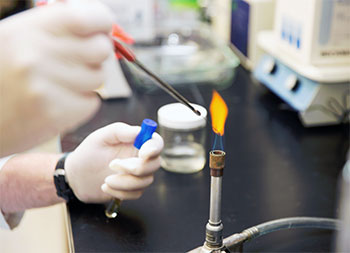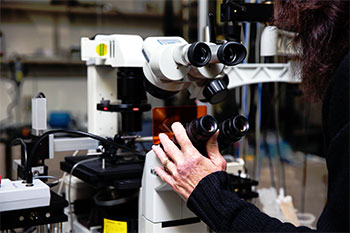Research Programs Boosted with Major Investment
School of Medicine awards grants to promising initiatives
Mark Couch
 (May 2017) In January 2016, Dean John Reilly, Jr., MD, announced five recipients of Transformational Research Funding awards.
(May 2017) In January 2016, Dean John Reilly, Jr., MD, announced five recipients of Transformational Research Funding awards.
These awards are major investments in programs that will position the University of Colorado School of Medicine as a leader in cutting-edge and emerging fields, attract extramural funding, help recruit and retain outstanding faculty, enhance education and training, and positively impact human lives and society in Colorado, the nation and the world.
These investments are funded by the Dean’s Office with a portion of clinical earnings by the faculty, from annual financial support from UCHealth, and from philanthropic contributions, including a commitment of $15 million by The Anschutz Foundation. No state-appropriated funding or student tuition or fees are being used for the Transformational Research Funding awards.
The awards were selected with the assistance of a committee of external reviewers who considered about 40 proposals submitted by faculty teams.
The initiatives that were selected are expected to catalyze:
- Innovative scholarship that makes significant contributions to knowledge and science in areas of strategic importance to CU, and that has potential to improve human lives, society, the environment, or the economy, will enhance culture and community, or provide
other public benefit ; - Multidisciplinary collaboration that positions CU as a national leader in these selected areas;
- Faculty teamwork across career stages to provide mentorship, support professional advancement, and position CU faculty as leaders in key fields; and
- Training opportunities in cutting-edge interdisciplinary or multi-disciplinary research.

Each project has a five-year budget totaling between $10 million and $20 million
During the past year, the leaders of the initiatives have been recruiting faculty, managing resources that promote collaborative science, organizing training and educational programming and sponsoring pilot research projects.
Each project is profiled on the following pages of this issue of CU Medicine Today. The five projects are
- Consortium for Fibrosis Research & Translation (
CFReT ) – Investigators in this program are working to discover the mechanisms that govern pathological fibrosis and to developtreatment for patients with diverse fibrotic diseases. - Data Science to Patient Value (D2V) – This initiative focuses on Big Data methods, their applications to medicine and health care delivery, and ultimately, the achievement of high value, patient-centered health care.
- GI and Liver Innate Immune Programs (GALIIP)– Researchers are addressing the unmet need in diagnosis, treatment
and understanding of many gastrointestinal and liver diseases, including fatty liver disease, eosinophilic esophagitis and inflammatory bowel disease. - Human Immunology & Immunotherapy Initiative (HI³) – HI³ is working on experimental models for the preclinical testing of therapeutics, reliable immunotherapeutic production, consistent clinical trials research support, and organized immune monitoring capabilities.
- RNA Bioscience Initiative – While modern biology has been revolutionized by the discovery that many processes of fundamental importance are regulated by RNA molecules, major knowledge gaps remain in the basic, diagnostic and therapeutic areas of RNA bioscience.